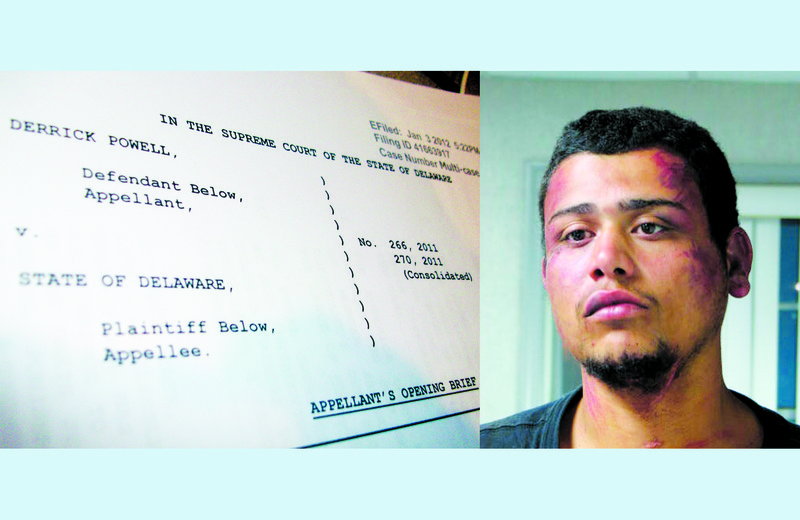The appeal process has begun for the man convicted of fatally shooting Georgetown Patrolman Chad Spicer. Defense attorneys say Derrick Powell did not receive a fair trial and his death sentence is unwarranted.
Superior Court Judge T. Henley Graves issued a death sentence for Powell, formerly of Cumberland, Md., May 20, 2011. Police say Powell shot Spicer near the intersection of North King and Rosa streets in Georgetown after a brief car chase Sept. 1, 2009.
Powell, 24, was convicted of first-degree murder Feb. 9 by a jury that later recommended the death sentence for Powell by a 7-5 margin. Defense attorneys Bernard O’Donnell, Nicole Walker and Santino Ceccotti filed an appeal to Delaware Supreme Court Jan. 3.
According to the appeal, Powell did not receive a fair trial for several reasons, including intense pretrial publicity and errors by police in collecting evidence. Defense attorneys wrote Powell’s request for a change of venue should have been granted because of inflammatory, sensationalized media coverage surrounding the case and intense community reaction to the death of a police officer.
The appeal referenced two dozen headlines from The News Journal, Delaware State News and the Cape Gazette published before the start of Powell’s trial and includes quotes from internet bloggers. One quoted blogger wrote, “They should have shot him through the head and then claimed he resisted arrest.”
The appeal also describes examples of the response from the Sussex County community, such as Spicer’s candlelight vigil, which was attended by more than 1,000 residents, and Spicer’s funeral, which was attended by more than 1,000 police officers and emergency responders, and broadcast on local radio station WGMD.
The appeal says, “It quickly became apparent that a ‘perfect storm’ had settled in Sussex County, and the necessity of a change of venue was critical if Powell was to receive a fair trial.”
A poll is referenced from University of Delaware’s Center for Applied Demography and Survey Research, which showed about 95 percent of 509 eligible Sussex County jurors had seen, heard or read something about the case. The poll also showed between 69 and 78 percent believed Powell was guilty before the trial began.
Despite this, the appeal says, Superior Court denied Powell’s motion for a change of venue.
The appeal also says Superior Court should have given the jury the option to convict Powell of second-degree murder.
Powell was charged with two counts of first-degree murder. On Feb. 14, 2011, the jury found Powell not guilty of the first charge against him: first-degree murder of an on-duty police officer. On the third charge against Powell – first-degree murder while attempting to flee from a robbery – the jury found Powell guilty. The jury had the option to reduce the third charge to manslaughter, but jurors chose not to.
Under Delaware law, second-degree murder is an included offense of first-degree murder, the appeal says. Powell requested second-degree murder be included for his third charge, but the court denied that request, attorneys wrote.
A second-degree murder conviction would have meant Spicer’s murder was not premeditated; had he been convicted on that charge, Powell would likely not have received the death penalty. “There was credible evidence that whoever shot Officer Spicer acted with criminal negligence as opposed to recklessness,” the appeal says.
The state also failed to collect Powell’s codefendant’s clothing to be tested for gunshot residue, the appeal says.
During the trial, expert testimony revealed gunshot residue was found on the hands of both Powell and Luis Flores, who was in the car with Powell when the shot that killed Spicer was fired. Powell’s clothing was tested for gunshot residue, but yielded no positive results.
Attorneys wrote, “Although Flores was also taken into custody, the police did not collect any of his clothing for examination as to the presence of gunshot residue.” According to the appeal, if Flores’ clothing had been tested, the results could have indicated Flores was holding the gun when it was discharged.
The appeal argues that a death sentence for Powell is cruel and unusual punishment under the U.S. Constitution.
The state did not charge Powell with intentional homicide, and there is no indication he committed the crime with a reckless indifference to human life, the appeal says. “At best, the evidence revealed that the homicide was ‘sudden or impulsive,’” defense attorneys wrote.
The purpose of the death penalty, the appeal says, is retribution and deterrence. Since Powell did not intend to commit murder on Sept. 1, 2009, his death sentence should be vacated.
Superior Court also should not have given great weight to the jury’s marginal recommendation that Powell be sentenced to death, the appeal says.
In June 2003, Delaware General Assembly passed House Bill 287, which said the court should give a jury recommendation “consideration as deemed appropriate.”
In error, the court gave “great weight” to the narrow 7-5 recommendation for the death penalty, the appeal says.
Lastly, the appeal sources similar first-degree murder cases in which the defendants did not receive the death penalty.
The appeal references eight cases in which a jury favored the death penalty by a 7-5 margin. In just two of the cases, the defendants were issued a death sentence, and one of those sentences has since been reversed.
“Each of the other cases involved either brutality, multiple victims, a home invasion or an attempt to destroy evidence by burning the dead bodies,” the appeal says. Powell did not kill anyone in a gruesome, brutal or vicious way, attorneys wrote.
“In our case, the imposition of the death penalty is disproportionate to the sentence imposed in similar cases,” the appeal says.
Defense attorneys ask that Powell’s convictions and sentences be reversed, and a new trial be conducted.
Representatives at the Attorney General’s Office could not be reached at press time.



















































